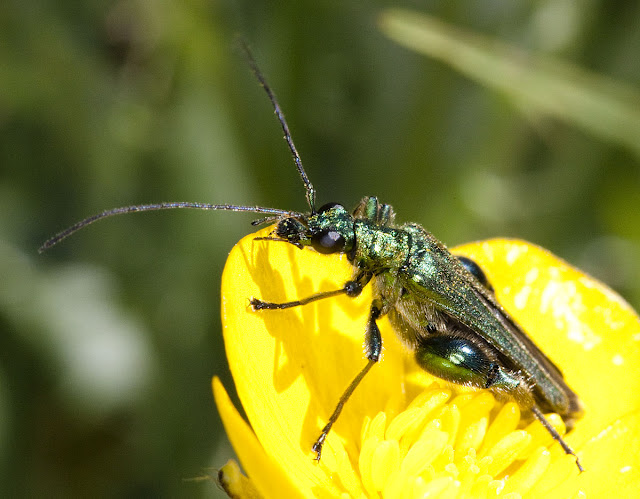 |
| Oedemera nobilis male on a buttercup beside the pond in Spring Park, 25 May 2011. |
I am getting more interesting results now with my EOS 450D and macro lens. I could have taken a photo like the second one with my Ixus 100; perhaps even a better one. But this one above is something else, and reveals much more about the creature; its hairiness, the details of its iridescence.
Such a photo is only possible if an insect will sit still, or nearly still, and let me get up close. Some will not. Butterflies and dragonflies shoot off as I approach.
 |
| Oedemera nobilis male on ox-eye daisy, Leucanthemum vulgare. Hayes Common, 21 May 2011. |
Well, femora is just the plural of femur. That is a most remarkable beetle! Your Canon DSL is truly remarkable. I keep looking here fore invertebrates that I hadn't noticed, but I can't find any.
ReplyDeleteYour macro lens, and your use of it, are indeed remarkable. No picture of oedemeria nobilis on line is any more detailed than that you took with the Ixus 100 (if that). But no other image of oedemeria that I have seen shows his texture and his hair and all his other details, let alone his shadow cast on a buttercup, as yours does, with the EOS 450D, and its Macro lens. It must be his best portrait in existence.
ReplyDelete(I ought to have used Preview, above comment, to remove the gratuitous -e on for).
Thank you. I am learning through persistence and patience. This beetle was posing in just the right position, so that I could take the shot without shading him, and get most of his side within the small depth of field a macro lens allows. Using the ring flash together with full sunlight gives great results.
ReplyDeleteThere are some insect portraits on line that are so detailed and sharp they must have been taken with a specialised lens like this one: http://en.wikipedia.org/wiki/Canon_MP-E_65mm_f/2.8_1-5x_Macro_lens But that would be a nightmare to use in the field.